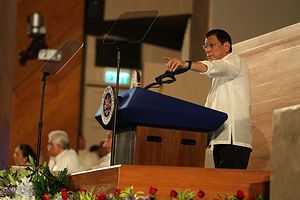Apart from skipping the ASEAN-Australia summit in Sydney last month, one other item where Philippines President Rodrigo Duterte generated much controversy in March was his assault on the International Criminal Court (ICC).
Duterte has previously questioned the credibility of international institutions, as he is prone to do with individuals and bodies that constitute threats to his power and authority. But things escalated last month with respect to the ICC in particular.
It all started in February when the ICC announced that it had begun a preliminary examination of a complaint for crimes against humanity and the thousands of deaths tied to his so-called “war on drugs.”
In response, Duterte lashed out against the ICC in March. He described the Rome Statute, used to establish the ICC, as “all bullshit” adding the court is backed by “white idiots.” He also made a number of other colorful statements, including the fact that it would not have jurisdiction over him “in a million years” and that it was a “rude” institution.
Duterte then moved to withdraw the Philippines from the ICC, and encouraged other countries to do so as well. His spokesperson Harry Roque Jr. even made the dubious statement that the Philippines’ withdrawal could spell “the beginning of the end of ICC” because of its influence on other countries.
In fact, the rhetoric from Duterte and his team seems far removed from reality. Sources close to the ICC have confirmed what most had already known: that any withdrawal from the court by the Philippines would not excuse Duterte from investigation or criminal proceedings, if they were to proceed.
“A state party can pull out of the Rome Statute (Burundi has). It takes one year to withdraw,” the source said. “But that act does not have retroactive effect, meaning that the ICC still has jurisdiction for all acts done whilst the state was a party.
“So it won’t help Duterte.”
Meanwhile, Duterte’s human rights abuses that spurred the complaints in the first place show few signs of stopping anytime soon. As we have seen in previous months, people, described by police as suspected drug users or dealers, have been killed in recent weeks. There continues to be debate even on the scale of the problem, with the government insisting the number of deaths is less than 4,000 and the New York-based Human Rights Watch saying the figure is more than 12,000.
“Since Duterte will never undertake a serious investigation into the ‘war on drugs,’ it’s up to the United Nations to support an international investigation and bring the mass killings to a stop,” Phelim Kine, deputy Asia director for HRW, said in a recent report.
To be sure, Duterte’s comments do add to the existing scrutiny already on the ICC. Though over 100 states have signed up since it was launched and there have hardly been any signs of the desertion Duterte and his team have mentioned, the ICC has been criticized for being too slow and expensive as well as not targeting its focus more at powerful Western states.
But Duterte’s latest assault on the ICC should be viewed as nothing more than a weak attack on justified international scrutiny of human rights violations that are not being addressed domestically. Unless Duterte and his administration focus on stopping those violations at home, they can have no complaints about an institution that is trying to address them abroad.
Luke Hunt can be followed on Twitter @lukeanthonyhunt































